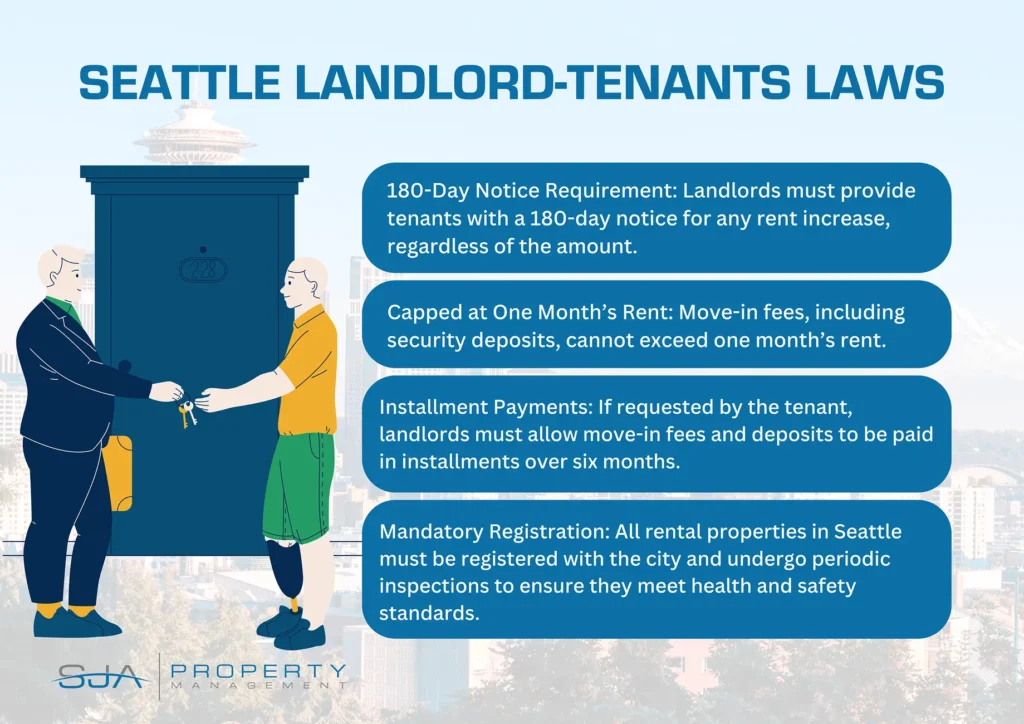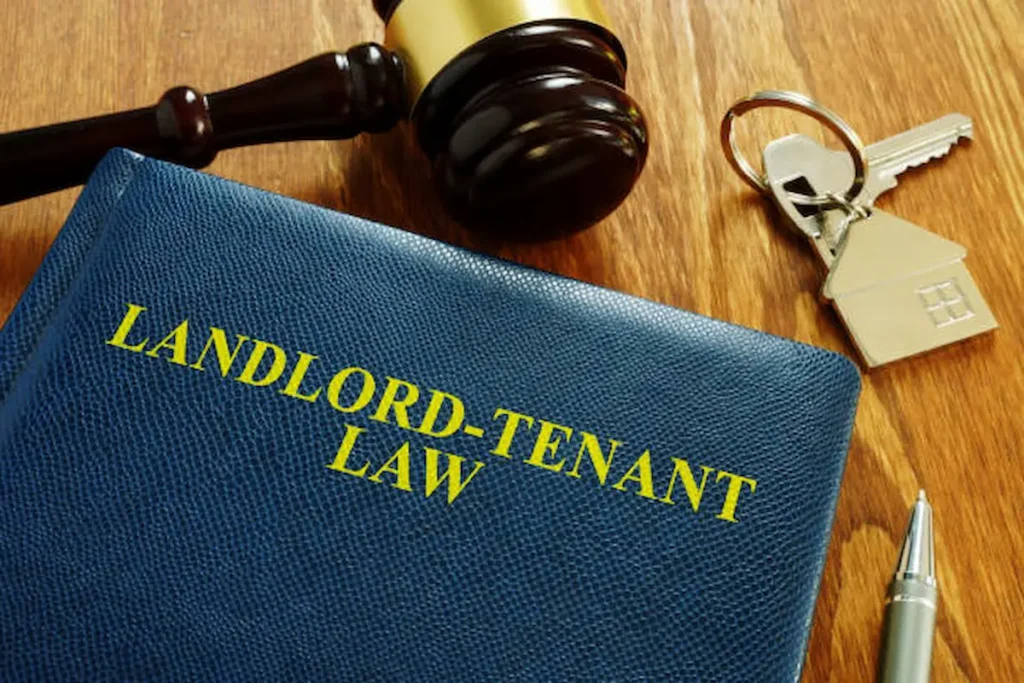Seattle has earned a reputation for its forward-thinking approach to tenant protections, standing out as one of the most renter-friendly cities in Washington State. While Washington has its own set of landlord-tenant laws, Seattle has gone a step further by introducing additional regulations aimed at promoting fair housing practices and safeguarding renters from unfair treatment.
Whether you’re a landlord trying to stay on top of your responsibilities or a tenant looking to understand your rights, this guide will walk you through Seattle’s key rental laws. We’ll cover everything from notice requirements and eviction rules to the protections in place for tenants. Ready to get started? Let’s dive in!
Key Landlord Obligations in Seattle
Seattle’s rental laws place specific responsibilities on landlords to ensure fair treatment of tenants. Here are the most important obligations:
Notice for Rent Increases
- 180-Day Notice Requirement: Landlords must provide tenants with a 180-day notice for any rent increase, regardless of the amount. This is significantly longer than the state requirement of 60 days and gives tenants ample time to adjust their budgets or make alternative housing arrangements.
Move-in Fees and Security Deposits
- Capped at One Month’s Rent: Move-in fees, including security deposits, cannot exceed one month’s rent.
- Installment Payments: If requested by the tenant, landlords must allow move-in fees and deposits to be paid in installments over six months. This helps reduce the financial burden on renters.
Just Cause Eviction Ordinance
- Valid Reasons Required: Landlords cannot evict tenants without a legally valid reason, such as:
- Non-payment of rent.
- Lease violations.
- Owner move-in or family occupancy.
- Substantial renovations or demolition of the property.
- No Retaliatory Evictions: Landlords cannot evict tenants in retaliation for exercising their rights, such as reporting housing code violations.
Rental Registration & Inspection Ordinance (RRIO)
- Mandatory Registration: All rental properties in Seattle must be registered with the city and undergo periodic inspections to ensure they meet health and safety standards.
- Compliance Required: Landlords must address any violations identified during inspections to maintain their rental license.
Tenant Protections in Seattle
Seattle’s tenant protections go above and beyond state laws to ensure renters are treated fairly and have access to safe, affordable housing. Here are the key protections:
Winter Eviction Ban
- November 1 to March 31: During these winter months, tenants cannot be evicted for non-payment of rent if they meet specific income qualifications.
- Purpose: This ban helps protect vulnerable tenants from homelessness during the coldest and wettest months of the year.
First-in-Time Ordinance
- First Qualified Applicant: Landlords must offer rental units to the first qualified applicant who meets the screening criteria.
- Prevents Discrimination: This rule helps prevent landlords from cherry-picking tenants based on personal preferences or biases.
Relocation Assistance
- Rent Increases Over 10%: If a landlord raises rent by more than 10%, and the tenant chooses to move out as a result, the landlord must provide financial relocation assistance.
- Amount Varies: The assistance amount depends on the size of the unit and ranges from 1,500 to 4,500.

How Seattle’s Laws Differ from State Laws
While Washington State has its own landlord-tenant laws, Seattle’s regulations are more stringent in several areas:
- Notice for Rent Increases: State law requires 60 days’ notice, but Seattle requires 180 days.
- Eviction Protections: State law allows no-cause evictions in some cases, but Seattle’s Just Cause Eviction Ordinance eliminates this option.
- Relocation Assistance: Seattle mandates financial assistance for tenants displaced by large rent increases, which is not required under state law.
Tips for Landlords to Stay Compliant
Navigating Seattle’s tenant-friendly laws can be challenging, but here are some tips to help landlords stay compliant:
- Stay Informed: Regularly check the Seattle Department of Construction and Inspections (SDCI) website for updates on rental laws.
- Document Everything: Keep detailed records of all communications, rent increases, and maintenance requests.
- Screen Tenants Fairly: Follow the First-in-Time Ordinance and avoid discriminatory practices.
- Plan Ahead: Account for the 180-day notice requirement when considering rent increases.
Tips for Tenants to Know Their Rights
If you’re a tenant in Seattle, here’s how to protect yourself:
- Read Your Lease: Understand the terms of your rental agreement, including rent increases and move-out procedures.
- Request Installments: If you can’t afford the full move-in costs upfront, ask your landlord to allow installment payments.
- Report Violations: If your landlord fails to maintain the property or violates your rights, contact the SDCI or a tenant advocacy organization.
- Know Your Eviction Rights: Familiarize yourself with the Just Cause Eviction Ordinance and the Winter Eviction Ban.
Seattle’s tenant-landlord laws are designed to create a fair and balanced rental market, but they can be complex to navigate. For landlords, understanding and complying with these regulations is essential to avoid legal disputes and maintain positive tenant relationships. For tenants, knowing your rights ensures you’re protected from unfair practices and can advocate for yourself when necessary.
Whether you’re a landlord or a tenant, staying informed is the key to a successful rental experience in Seattle. If you have questions or need further assistance, consider consulting a legal expert or reaching out to local housing authorities.
Disclaimer:
Whether you’re a landlord or a tenant, staying informed is essential for a smooth and successful rental experience in Seattle. We are not providing legal advice, and for specific legal questions or concerns, we recommend consulting an attorney or reaching out to local housing authorities for expert guidance.






